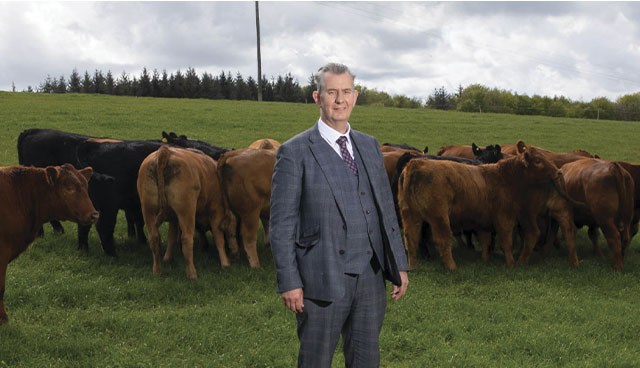Net zero carbon: An unfortunate ‘compromise’

The Minister for Agriculture Edwin Poots MLA has welcomed the passage of “ground-breaking” climate legislation despite its inclusion of a net zero for 2050 target, which he previously said would have “profound and irreversible” consequences on Northern Ireland’s agri-food sector and the economy.
At the final stage of passage of his Climate Change Bill (No. 2) in the Assembly, the Minister managed to retrieve some control of the Bill, which had been heavily amended by MLAs to include targets beyond those recommended by the UK’s Climate Change Committee, by introducing a split in targets for greenhouse gas reduction, which will see methane emission targets reduced.
The Minister’s Bill had originally targeted an 82 per cent reduction in greenhouse gas emissions by 2050 but during scrutiny of the Bill, MLAs backed an amendment to raise the ambition to net zero by 2050.
An attempt by Green Party NI leader Clare Bailey MLA to go further and reduce the timeframe initially fell because Bailey was absent from the chamber when her amendment was to be raised.
At the time the Minister vowed to find a way of “undoing the damage”.
The Minister’s Bill faced multiple amendments when first opened to debate in the Assembly chamber and a further 70 amendments were proposed at its final stage, including from the Minister.
While an amendment by the Minister to remove agriculture emissions from the net zero target fell, Poots was successful in achieving a 46 per cent reduction of methane on baseline levels target, in line with recommendations from the Intergovernmental Panel on Climate Change (IPCC), and the UK’s Climate Change Committee (CCC).
Methane is a more potent greenhouse gas than carbon dioxide. It is estimated that over 100 years, it is 28 times more powerful than carbon dioxide at warming the Earth and 80 times more powerful over 20 years. However, critics had argued that more ambitious methane targets would adversely impact on agriculture in Northern Ireland.
Announcing that “common sense has prevailed”, Poots said: “I have been clear and consistent throughout this process that we should follow the advice of the experts and set targets on the basis of the evidence. Unfortunately, some compromise was necessary, but I have done my best to mitigate and offset negative and unfair impacts from these, to realign the Bill back to science and evidence and to ensure that it can be as legally effective as possible.
“Although this Bill sets a legally binding net zero target, it will not require a level of net methane emissions reduction of more than 46 per cent by 2050…This will ensure that the net zero ambition will not disadvantage our local food production and require our agriculture sector to shut down.”
Once given Royal Assent, the Act will mean that Northern Ireland will no longer be the only part of the UK and Ireland without climate change legislation in place.
The introduction of the Minister’s Bill had succeeded the earlier introduction of the Climate Change Bill by way of a Private Member’s Bill by Bailey. Despite originally progressing through the Assembly’s various scrutiny functions in conjunction with the Minister’s Bill, albeit at a slower pace given that Executive Bills receive priority, the Bill has now been withdrawn following the amendments to the Minister’s Bill.
Welcoming the passage of the Climate Change (No.2) Bill through its final stage, the Green Party NI leader said that her party had secured 12 amendments to transform the bill including a net zero target, an independent climate commissioner and a bespoke Just Transition Fund for Agriculture.
“The Bill is not everything that we wanted, but it is an important first step which we need to keep building on,” she said.
“What we need to see now from the Assembly, from every department and from every political party is the bravery to step up and put the policies in place that will secure a sustainable future in which the people of Northern Ireland can thrive.
“The climate crisis is the biggest crisis facing humanity and our planet. We need to play our part, and with this legislation, we now have the building blocks to start moving forward.”
|
Key elements of Northern Ireland’s Climate Bill • 100 per cent carbon emission reduction by 2050 |





